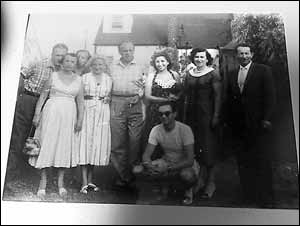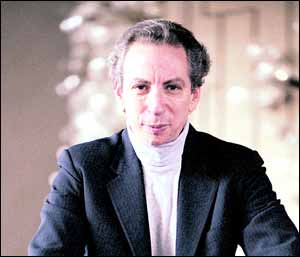|
PROFILE Conductor Arthur’s debt to hero Oskar Schindler | ||
ABBEY Road may have been where The Beatles recorded most of their work, but the London-based studio has also welcomed myriad musicians over the years.
The latest is Arthur Fagen who, since 2010, has been music director of the Atlanta Opera. New York-born Arthur was at the legendary studios to work on the Lim Fantasy of Companionship for Piano and Orchestra, where he conducted acclaimed pianist Tedd Joselson alongside the London Symphony Choir and London Voices. He also conducted Joselson and the Philharmonia Orchestra — who recorded the Rachmaninov Piano Concerto No 2 — and the Royal Philharmonic Orchestra — who performed the Grieg Concerto for Piano and Orchestra. “It was my first time working at Abbey Road,” Arthur told me. “It is obviously a place steeped in history. I remember first seeing The Beatles live on the Ed Sullivan Show in 1964.” The Lim Fantasy of Companionship for Piano and Orchestra was commissioned by Dr Susan Lim, a Singaporean surgeon who is a specialist in the field of transplantation, robotics and stem cell research. The work was written by French composer Manu Martin and arose out of Lim’s ALAN project, which aims to explore the intersection between technology and humanity — in the form of robotics and artificial intelligence — via music. The recording is scheduled for release next year. Arthur, who is also professor of music in instrumental conducting at Indiana University’s Jacobs School of Music, knew what career he wanted from a young age. Firstly, however, he had to convince his parents, Poland-born Rena and Lewis — whose lives were saved by Oskar Schindler. Schindler risked his life to save 1,100 Jews from the concentration camps during the Holocaust. Arthur’s original surname was Feigenbaum and his mother and father were childhood friends in Krakow. Rena and Lewis were incarcerated in Auschwitz and Plaszow concentration camps, respectively. Schindler, meanwhile, had taken over a Jewish-owned enamelware factory outside Krakow and renamed it Deutsche Emailwarenfabrik, where he hired Jews — including Rena and Lewis — to produce cookware and, later, munitions for the German army. Rena and her mother arrived in America in 1946, and Lewis and his parents a year later. Lewis (born Ludwik) is mentioned prominently in Schindler’s Ark, Thomas Keneally’s book inspired Steven Spielberg to make the film Schindler’s List. In 1993, Spielberg flew Rena and Lewis, and three other American “Schindlerjuden”, to Jerusalem for the filming of the moving epilogue of Schindler’s List. In the final scene of the Oscar-winning film, Jews saved by Schindler and some of their descendants place stones on his grave in the Roman Catholic Franciscans’ cemetery in Jerusalem. “According to my father, the film was not nearly as gruesome as the reality,” explained Arthur, who lives in Bloomington, Indiana. “Our family knew Oskar quite well and I am told he even visited our home in Long Island in 1957, but I was too young to remember. “When I was working in Frankfurt in 1972, I met up with him for lunch. “He was poor and an alcoholic, and living off hand-outs from those he had saved. “He died two years later and never enjoyed the recognition he had posthumously.”
“My father was obsessed with his children having financial security, so my wanting to become a musician was not something he took to very well,” he said. “He fought me every step of the way. Although he felt at home in America, he had a tremendous sense of inner insecurity that something catastrophic was going to happen at any moment. “It was imparted to us through the mother’s milk, so to speak.” A chance encounter, when he was 16, with Hungarian-Jewish conductor Laszlo Halasz set Arthur on his way. The first director of the New York City Opera was staying at the same resort as Arthur and his parents — and Arthur began his conducting studies with Halasz. Further studies continued at Wesleyan University, the Curtis Institute of Music and the Salzburg Mozarteum before, at the age of just 20, Arthur became assistant conductor to Christoph von Dohnanyi at the Frankfurt Opera. And, perhaps surprisingly, his parents did not object to him moving to Germany. Arthur recalled: “I really didn’t expect that. “I don’t know if it was because they knew it was a great opportunity for me, but it was something I could not reconcile — they even came to see me.” He went on to serve numerous positions, including chief conductor of the Flanders Opera of Antwerp and Ghent, music director of the Queens Symphony Orchestra and music director of the Dortmund Philharmonic Orchestra and the Dortmund Opera. Father-of-three Arthur, who is married to Paulette, has also conducted opera productions at the Lyric Opera of Chicago, Munich State Opera, Deutsche Oper Berlin, New Israeli Opera, Baltimore Opera and Edmonton Opera, and was guest conductor at the Vienna State Opera. A pertinent subject in the classical music world is how to influence the younger generation — especially when there is so much choice around, as well as other distractions. Arthur explained: “Classical music will always be relevant in the sense that going to a museum will always be relevant. “In Germany, for example, they stage operas in a way which makes them culturally relevant to present-day society. “Nowadays there is also emphasis on technical perfection and a certain sheen. “There has also been a wave of young, female conductors, so the pendulum always swings in different directions.”
If you have a story or an issue you want us to cover, let us know - in complete confidence - by contacting newsdesk@jewishtelegraph.com, 0161-741 2631 or via Facebook / Twitter

|
 MEMORIES OF OSKAR: Oskar Schindler is pictured, centre, at the Fagens’ Long Island home. Rena Fagen is pictured next to him, right, and in front is Lewis Fagen
MEMORIES OF OSKAR: Oskar Schindler is pictured, centre, at the Fagens’ Long Island home. Rena Fagen is pictured next to him, right, and in front is Lewis Fagen